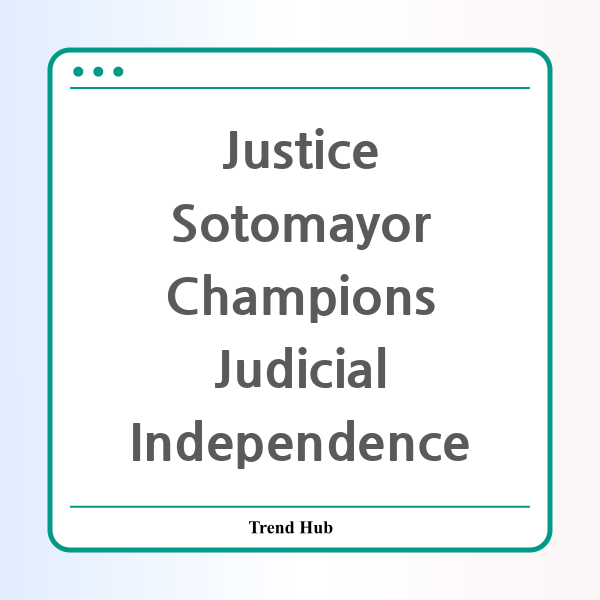* This website participates in the Amazon Affiliate Program and earns from qualifying purchases.

In a climate charged with political tension and divisive rhetoric, the role of an independent judiciary has never been more critical. Recently, Supreme Court Justice Sonia Sotomayor articulated the importance of maintaining a judiciary that operates without fear or bias during her address at Georgetown Law Center. Her message underscored the essence of a sustained commitment to the rule of law and the need for legal professionals to advocate for judicial independence.
Justice Sotomayor noted the peril of ‘arbitrary power’—a term that resonates deeply in today’s political landscape where government actions can often seem capricious and self-serving. "Arbitrary power is just that, and it means that anyone is going to be subject to unfairness at someone else’s whim,” she stated, illustrating the dangers posed not only to individual rights but to the foundational principles that uphold democracy itself.
Her remarks came amidst heightened scrutiny of the judiciary from various political figures, particularly following challenges to executive actions that have met resistance in the courts. The Trump administration has faced significant hurdles in implementing its policies, often resulting in public criticisms of judges who have ruled against these initiatives. This confrontational stance raises fundamental concerns about the respect for the judiciary as a pillar of democracy.
During her address, Sotomayor stressed that the independence of judges is vital for protecting the constitutional rights afforded to all citizens. She remarked, “We have to get up and explain and repeat and explain again why judicial independence is critical to everyone’s freedom.” The call for active advocacy speaks to the responsibility of not only judges but also legal practitioners and citizens to defend the integrity of the legal system.
The idea of norms in governance was also pivotal in her discussion. Norms, while not legally binding, serve as ethical guidelines that help define appropriate behavior for government officials. When these norms are breached, it can lead not just to political discord but to a significant undermining of public trust in the legal system. Sotomayor warned, “Once norms are broken, then you’re shaking some of the foundation.”
In light of these challenges, the role of judges as impartial arbiters becomes increasingly crucial. Sotomayor's call for judges to be 'fearlessly independent' reflects the need for an unwavering commitment to impartiality in the face of public opinion or political pressure. This independence ensures that justice is not only served but perceived to be served fairly and equitably, reinforcing public confidence in the judiciary.
As we navigate these tumultuous times, it is essential for all citizens to recognize the importance of a strong and independent judiciary. Advocacy for judicial independence is not merely the responsibility of the judiciary itself but a collective societal obligation. By understanding the role of judicial independence in safeguarding democratic freedoms, we can work towards a future where arbitrary power does not dictate the fortune of individuals but where justice prevails consistently across the board.
In conclusion, Justice Sonia Sotomayor’s emphasis on the independence of the judiciary serves as a crucial reminder of the responsibilities entrusting the legal system. It calls upon all citizens to be vigilant and advocate for a fair justice system that remains untarnished by political influence. Only through commitment to the rule of law can we ensure that freedom and fairness remain the bedrock of our democracy.
* This website participates in the Amazon Affiliate Program and earns from qualifying purchases.